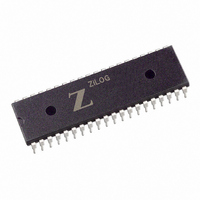Z84C2008PEG Zilog, Z84C2008PEG Datasheet - Page 31

Z84C2008PEG
Manufacturer Part Number
Z84C2008PEG
Description
IC 8MHZ Z80 CMOS PIO 40-DIP
Manufacturer
Zilog
Series
Z80r
Specifications of Z84C2008PEG
Processor Type
Z80
Features
Low Power CMOS
Speed
8MHz
Voltage
5V
Mounting Type
Through Hole
Package / Case
40-DIP (0.620", 15.75mm)
Cpu Speed
8MHz
Digital Ic Case Style
DIP
No. Of Pins
40
Supply Voltage Range
5V
Operating Temperature Range
-40°C To +100°C
Svhc
No SVHC (18-Jun-2010)
Rohs Compliant
Yes
Processor Series
Z84C2xx
Core
Z80
Data Bus Width
8 bit
Maximum Clock Frequency
8 MHz
Number Of Programmable I/os
16
Operating Supply Voltage
0 V to 5 V
Maximum Operating Temperature
+ 100 C
Mounting Style
Through Hole
Minimum Operating Temperature
- 40 C
Base Number
84
Clock Frequency
8MHz
Lead Free Status / RoHS Status
Lead free / RoHS Compliant
Available stocks
Company
Part Number
Manufacturer
Quantity
Price
Company:
Part Number:
Z84C2008PEG
Manufacturer:
Zilog
Quantity:
20
- Current page: 31 of 308
- Download datasheet (2Mb)
TIMING
UM008005-0205
Overview
The Z80 CPU executes instructions by stepping through a precise set of
basic operations. These include:
•
•
•
All instructions are series of basic operations. Each of these operations can
take from three to six clock periods to complete or they can be lengthened to
synchronize the CPU to the speed of external devices. The clock periods are
referred to as T (time) cycles and the operations are referred to as M
(machine) cycles. Figure 4 illustrates how a typical instruction is series of
specific M and T cycles. Notice that this instruction consists of three
machine cycles (M1, M2, and M3). The first machine cycle of any
instruction is a fetch cycle which is four, five, or six T cycles long (unless
lengthened by the WAIT signal, which is described in the next section). The
fetch cycle (M1) is used to fetch the opcode of the next instruction to be
executed. Subsequent machine cycles move data between the CPU and
memory or I/O devices, and they may have anywhere from three to five T
cycles (again, they may be lengthened by wait states to synchronize the
external devices to the CPU). The following paragraphs describe the timing
which occurs within any of the basic machine cycles.
During T2 and every subsequent Tw, the CPU samples the WAIT line with
the falling edge of Clock. If the WAIT line is active at this time, another
WAIT state is entered during the following cycle. Using this technique, the
read can be lengthened to match the access time of any type of memory
device.
Memory Read or Write
I/O Device Read or Write
Interrupt Acknowledge
User’s Manual
Z80 CPU
Overview
11
Related parts for Z84C2008PEG
Image
Part Number
Description
Manufacturer
Datasheet
Request
R

Part Number:
Description:
Communication Controllers, ZILOG INTELLIGENT PERIPHERAL CONTROLLER (ZIP)
Manufacturer:
Zilog, Inc.
Datasheet:

Part Number:
Description:
KIT DEV FOR Z8 ENCORE 16K TO 64K
Manufacturer:
Zilog
Datasheet:

Part Number:
Description:
KIT DEV Z8 ENCORE XP 28-PIN
Manufacturer:
Zilog
Datasheet:

Part Number:
Description:
DEV KIT FOR Z8 ENCORE 8K/4K
Manufacturer:
Zilog
Datasheet:

Part Number:
Description:
KIT DEV Z8 ENCORE XP 28-PIN
Manufacturer:
Zilog
Datasheet:

Part Number:
Description:
DEV KIT FOR Z8 ENCORE 4K TO 8K
Manufacturer:
Zilog
Datasheet:

Part Number:
Description:
CMOS Z8 microcontroller. ROM 16 Kbytes, RAM 256 bytes, speed 16 MHz, 32 lines I/O, 3.0V to 5.5V
Manufacturer:
Zilog, Inc.
Datasheet:

Part Number:
Description:
Low-cost microcontroller. 512 bytes ROM, 61 bytes RAM, 8 MHz
Manufacturer:
Zilog, Inc.
Datasheet:

Part Number:
Description:
Z8 4K OTP Microcontroller
Manufacturer:
Zilog, Inc.
Datasheet:

Part Number:
Description:
CMOS SUPER8 ROMLESS MCU
Manufacturer:
Zilog, Inc.
Datasheet:

Part Number:
Description:
SL1866 CMOSZ8 OTP Microcontroller
Manufacturer:
Zilog, Inc.
Datasheet:

Part Number:
Description:
SL1866 CMOSZ8 OTP Microcontroller
Manufacturer:
Zilog, Inc.
Datasheet:

Part Number:
Description:
OTP (KB) = 1, RAM = 125, Speed = 12, I/O = 14, 8-bit Timers = 2, Comm Interfaces Other Features = Por, LV Protect, Voltage = 4.5-5.5V
Manufacturer:
Zilog, Inc.
Datasheet:

Part Number:
Description:
Manufacturer:
Zilog, Inc.
Datasheet:











